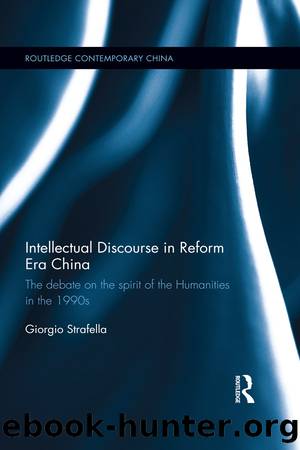Intellectual Discourse in Reform Era China by Giorgio Strafella

Author:Giorgio Strafella [Strafella, Giorgio]
Language: eng
Format: epub
ISBN: 9780367026974
Barnesnoble:
Publisher: Taylor & Francis
Published: 2019-01-10T00:00:00+00:00
Sakai Hirobumi notes how cultural criticism in the 1990s âfrom many perspectives attempted to turn âthe 1980sâ into an object of analysisâ and the debate marked the beginning of this trend (Sakai, 2011: 18). Cai Xiangâs words in the passage above exemplify the attempt â after the 1989â1992 watershed â to look back at the 1980s and critique the attitude of the intellectuals during that decade of âutopianâ optimism (see also Cai Xiang, 1994: 49).
Finally, Cai Xiang admitted that by unleashing market forces the reforms had brought forward consequences unforeseen by intellectuals in the 1980s. When the intellectualâs âutopiaâ failed to materialise, a modern lexicon of socio-cultural ideals became an object of derision, he lamented. Key values such as freedom, equality and justice were given a new âsecular interpretation by the urban classâ (Xu Jilin et al., 1994: 48). âFreedomâ became freedom to get rich, and âequalityâ materialised in the opportunity to start a business. In his view this represented a regression to a primitive search for âsensorial satisfactionâ, leading to âvulgarisationâ and mediocrity. This consideration made him reflect on the discursive mode and social relevance of Chinese intellectuals:
If a certain intellectual movement is unable to turn itself into a common social practice, then one should doubt of its âtemporalâ meaning. Once it is transformed into a vulgarised social practice, however, what we obtain is indeed a bitter fruit. The intellectualâs romantic view of society and the individual completely vanished as soon as it came into contact with reality. The masses are controlled by some kind of autonomous economic interest, they pursue the satisfaction of the organs and reject the tireless admonishing of the intellectual â the bell has rung, the lesson is over and the intellectualâs identity as âtutorâ has self-destroyed.
(Xu Jilin et al., 1994: 48)
Download
This site does not store any files on its server. We only index and link to content provided by other sites. Please contact the content providers to delete copyright contents if any and email us, we'll remove relevant links or contents immediately.
Cecilia; Or, Memoirs of an Heiress — Volume 1 by Fanny Burney(31366)
Cecilia; Or, Memoirs of an Heiress — Volume 3 by Fanny Burney(30962)
Cecilia; Or, Memoirs of an Heiress — Volume 2 by Fanny Burney(30918)
The Great Music City by Andrea Baker(22154)
We're Going to Need More Wine by Gabrielle Union(18100)
Bombshells: Glamour Girls of a Lifetime by Sullivan Steve(13132)
Pimp by Iceberg Slim(12965)
All the Missing Girls by Megan Miranda(12798)
Fifty Shades Freed by E L James(12474)
Talking to Strangers by Malcolm Gladwell(11935)
Norse Mythology by Gaiman Neil(11932)
Crazy Rich Asians by Kevin Kwan(8386)
Mindhunter: Inside the FBI's Elite Serial Crime Unit by John E. Douglas & Mark Olshaker(7870)
The Lost Art of Listening by Michael P. Nichols(6502)
Enlightenment Now: The Case for Reason, Science, Humanism, and Progress by Steven Pinker(6430)
Bad Blood by John Carreyrou(5798)
The Four Agreements by Don Miguel Ruiz(5547)
Weapons of Math Destruction by Cathy O'Neil(5068)
We Need to Talk by Celeste Headlee(4898)
